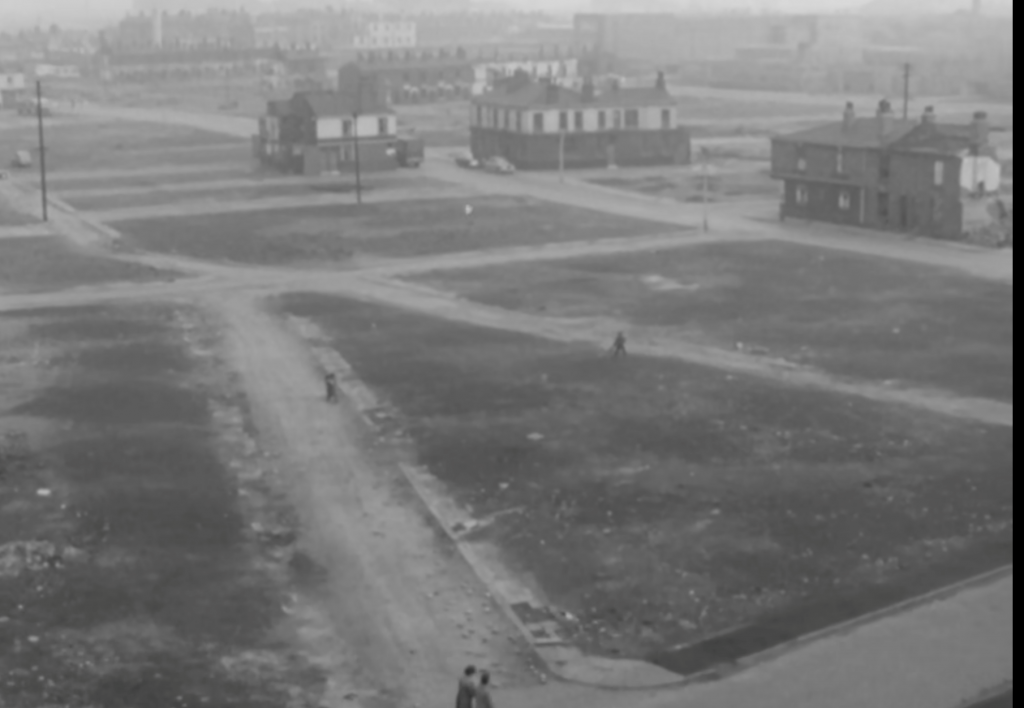This week we feature a guest post from Eddy Rhead of the Modernist Society written as a response to a news clip on Hanky Park which recently featured on the BBC Archive twitter account.
Recently a news clip from 1969 appeared on the wonderful BBC Archive site which looked at the last days of the pubs that survived the redevelopment of Hanky Park. The clip starts with a elevated shot of reporter Julian Pettifer stood on a classic cobbled street, but as the camera pans back it reveals the huge scars of the mass demolition of the area, with little remaining except the roadways and the odd pub, standing defiantly against the wrecking crews.

Pettifer then proceeds to visit some of the pubs remaining and finds them not only hanging on, but positively thriving. He interviews the men (it is all men – the only women in the clip are bar staff or housewives seen walking in the desolate streets ) about their thoughts on the pubs they frequented and how they felt about their imminent demise. Throughout, there seems to be little anger from patrons or landlords, just a weary acceptance that their fate was sealed and that they had little or no influence on this huge change in their own lives and the communities they lived in. Almost all of the drinkers had travelled back from their new homes to which they had been displaced – Trinity, Kersal and Little Hulton are all mentioned – to drink in places they felt comfortable in. A couple of the interviewees who had moved away, lamented that they couldn’t settle or felt uncomfortable in their new homes, separated from their old friends and places that were comfortably familiar to them.
The whole clip is deeply moving, with Pettifer who was educated at Marlborough College and Cambridge University, dispassionately seeking to understand why these men would travel long distances to drink in dilapidated and ultimately doomed pubs. It does little to question the wisdom of destroying entire communities and the mass trauma that the people of Hanky Park must have endured as everything they knew and cherished was torn down around them.
Hindsight is a wonderful thing and the local authorities who carried out slum clearances and urban redevelopments were clearly well-meaning. However the total misunderstanding of what was important to working class communities is laid bare in this clip. Of course better housing and better opportunities were desperately needed, but to uproot whole communities and destroy the things that they cherished is typical of the patriarchal and top down ‘regeneration’ that planners and politicians seem so rooted to, even to this day. Decision makers, mostly middle class, saw little value in the pubs, dancehalls and cinemas that working class people valued greatly and even if new housing was provided these leisure and cultural facilities were irreplaceable and often seen as an afterthought when planning new developments.
Whilst the replacement housing at Hanky Park and Ellor Street was far from perfect, it was an improvement on what it replaced. Yet to dissipate communities and destroy many of the cultural touchstones that bound those communities together is pretty unforgivable, and the damage it did is still being felt to this day.
You can see the clip on the BBC Archive home page
On Twitter
And on Facebook
No words can capture the gravity of what happened here as this film clip has.
Hanky Park was pulled down for political reasons under Labour’s 1930 Housing Act Slum Clearance Programme ( “social cleansing” ) as was Hulme Manchester in the late 1960s when I was a student at Manchester College of Art. Labour also destroyed my home town and birth place Merthyr Tydfil ( Caedraw ) 1962 – 64, where Keir Hardie was MP before the First World War. From Chartered Architect Royal Institute of British Architects ( RIBA ) + Royal Society of Architects in Wales